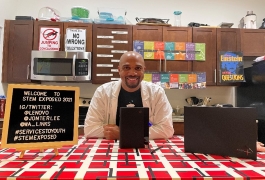Five Ways to Find and Secure an Internship

Working for two summers as a student intern at St. Jude Children’s Research Hospital in Memphis, TN, provided me with one of the best work experiences I could have ever received as an undergraduate. During those six months, I learned about the many facets of medical research work and built multiple skills, analyzing samples in the laboratory, interacting with the nurses and patients in the Medicine Room, and pulling patient charts and assimilating data for clinical research studies. That internship allowed me to witness how our work moved from the bench to the bedside and gave me a window into different career paths in the science field.
Today, internships bring the same benefits to undergraduates who will be competing for jobs in the near future. In addition to providing a way to test-drive a prospective career, internships are a great way to apply classroom knowledge to a real-world work environment. And they allow you to build new skills that make you a more attractive candidate when you begin to look for your first post-graduation job. Sometimes, internships can lead to full-time positions in the same organizations. However, competition for internship positions can be fierce.
Here are five tips for finding and securing those coveted positions.
1. Network, network, network!
Networking gives you several advantages. First, while many companies post job openings on websites and databases (like Get Experience), many do not advertise their internships. Networking is also a good way to gain information on fields you might be interested in, so you know where to look. And, since people are more likely to hire a familiar face, networking can also help you land a position.
To maximize your internship opportunities, take any and every chance you can to get out and meet people in your field. Attend career fairs, mock interview sessions, company visits, and ACS local, regional, and national meetings.
Create a LinkedIn profile and begin making connections at the companies you are interested in. LinkedIn also has professional groups you can join as well as event listings. Other social media channels, such as Twitter and Facebook, can also help you connect and keep up-to-date on company news. Your professors/adviser and your university’s Career Services Department may also be able to help you connect with prospective employers.
There are a number of people you can connect with, and recruiters should be at the top of your list. Statistics show most recruiters use LinkedIn as a recruiting tool, and many look to connect with students in the fields in which they are hiring. You should also try to connect with the chemists you may potentially work for or work with). They can provide a lot of detail about the company, ranging from the work itself to some of the challenges you may face as an intern.
How do you connect? The best way to make a connection is to provide a more personal introduction. On LinkedIn, personalize your connection request, but keep in mind there is a word limit. Something as simple as saying, “I am an Analytical Chemistry major and am very interested in your company. Any feedback or advice on pursuing positions with XYZ company would be sincerely appreciated” can help you get a foot in the door. Showing you are specifically interested in their company can go a long way.
2. Research prospective employers
Do your homework to find companies and organizations that focus on your areas of interest. For example, if you are looking for positions in analytical chemistry, search analytical chemist jobs in your area (or other locations of interest) on job boards. The open positions listed on those job boards can tell you what types of chemists they hire as well as some of the work they do in their role. Indeed.com, LinkUp.com, and C&EN Jobs are great places to start.
Once you identify your target employers, make sure you understand what the company or organization does. Scour its website, read articles, scan social media, etc. Does the company’s work interest you? How will you apply your knowledge in their environment? If you have started networking with employees, reach out and ask them any questions you may have about the company or position.
Once you have made your connections, ask any questions that might help you determine if the company is the right fit for you. Here are a few questions you may want to ask:
- What does an intern do at your company?
- Are there opportunities for a full-time[hyphen] position after the internship is completed?
- What do you enjoy most about working at your company?
- What do you think are the biggest challenges?
- What advice would you give to someone interested in working at your company?
It is important to keep in mind that not all companies have the same internship timeframe. Ensure you ask the right questions so you will know when you should be prepared to submit your application. Many employers begin recruiting for positions in the fall at campus career fairs. Although they may not always accept applicants this early, it is a good time to begin making those connections. Employers may accept applications at any time throughout the year, and special projects could spur an opportunity at any time. Summer programs are very popular, but there are also co-op programs that can continue during the school year. Additionally, some school programs partner with local companies to offer educational credits.
3. Meet the job requirements and complete the application process
Great applicants sometimes miss out on landing internship opportunities because they fail to meet the outlined requirements or don’t provide all required documents on time. Make sure you read through the requirements for each program and submit all items on time. Most programs require a minimum GPA, letters of recommendation, a detailed cover letter, résumé, and transcripts.
A complete application packet is a must, but you also want to ensure your application is competitive with others being reviewed. To stand out, provide a polished, detailed résumé tailored to the position and a cover letter that outlines how you can contribute to the organization.
A professional summary at the top of your résumé, highlighting the skills most relevant to the job, is very eye-catching and can make the reviewer want to read more of the résumé. Provide additional detail on research you have conducted, along with laboratory techniques and instrumentation experience you have received.
Remember to adjust your résumé for each position to highlight the skills that are most relevant. You may find it helpful to keep a “master résumé” of all of your skills and experience that you can tailor for different positions.
4. Demonstrate the skills needed to be successful
After reading the job description, consider where you could immediately contribute to the position and where you would need additional training. Will you be able to perform the job successfully? Ask a mentor or adviser for feedback.
If the internship requires experience with specific instruments that are not familiar to you, find a way to shadow someone at your college/university to gain some knowledge in those areas. Research relevant topics online, if needed, and review your laboratory books and notes.
Having soft skills can also help you stand out in a crowd of applications. Have you volunteered with an organization, participated in any clubs, etc.? Depending on your role, these experiences can also show you have strong teamwork and collaboration skills. Did you hold a leadership position in a college organization? Share that information as well. If you have examples of research papers and/or presentations you have worked on, be prepared to share them.
5. Prepare for the interview
All of your hard work has brought you to the interview, so you will want to make the best possible impression. Dress professionally and wear lab-appropriate shoes. Show up on time, preferably a few minutes early. Bring copies of all of your application materials in case anyone asks for them. If your interview requires a presentation, be prepared.
Practice interviewing with a career counselor (from your school or ACS) or even a friend until you are comfortable.
Here are a few examples of questions you can use for practice.
- Tell me about a time you made a mistake in your work. How did you handle it and what was the outcome?
- If you were to obtain this position, where do you feel you could contribute immediately and where would you need additional training?
- What skills and abilities do you have that would make you a great fit for this position?
- Why would you be the best candidate for our internship?
- What do you hope to take away from this internship?
Project confidence, in a humble manner, but do not exaggerate your abilities. Remember your interview starts as soon as you arrive, so be courteous and professional to everyone you meet. Also keep in mind that not only is the company interviewing you but you are also interviewing them. Internships are meant to be a mutually beneficial program. If something doesn’t feel right, trust your gut. It is OK to decide something is not a fit for you and withdraw from consideration. After your interview, always send a follow-up e-mail or note to thank your interviewers and, if appropriate, reiterate your interest in the opportunity.
Final thoughts
Landing a good internship isn’t easy, but it is worth the effort. Early work experience pays dividends that can last a lifetime. For me, internship opportunities helped me set my career trajectory. Although I ultimately shifted from conducting laboratory research right out of school to working in scientific recruitment (and hiring interns for my current employer), I still draw on the foundation of experience and skills that I began to build as an undergraduate intern at St. Jude so many years ago.



